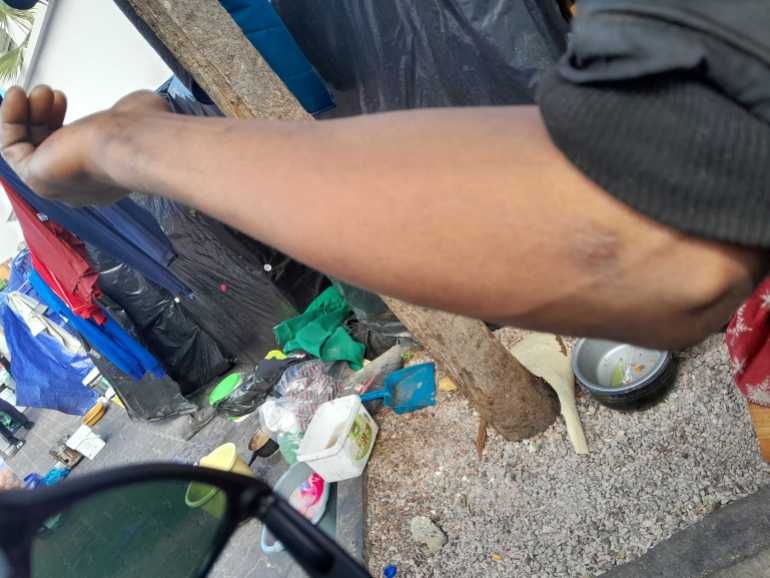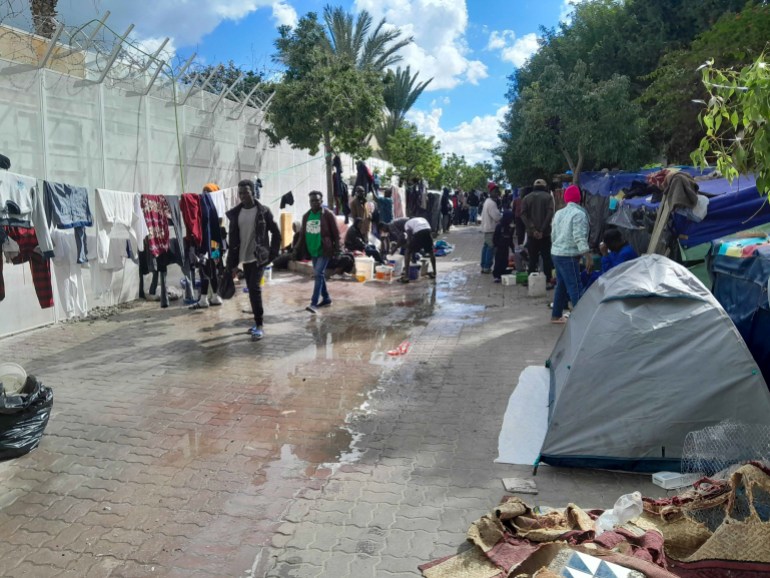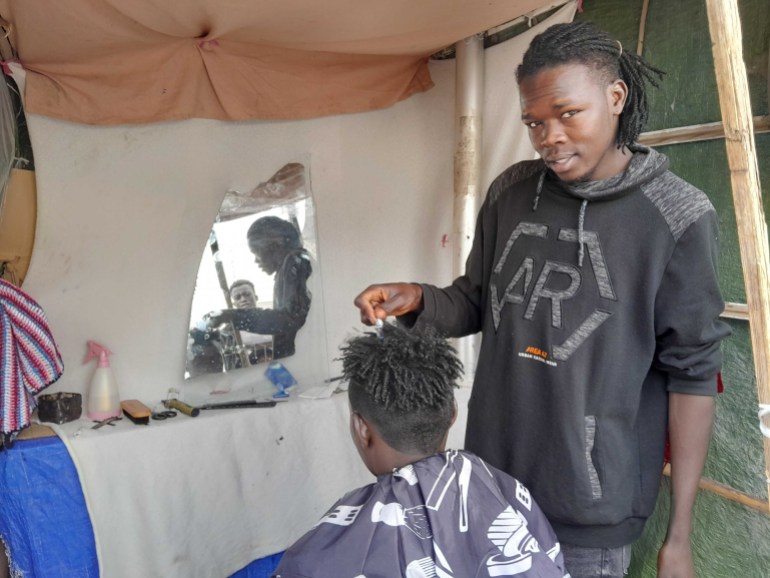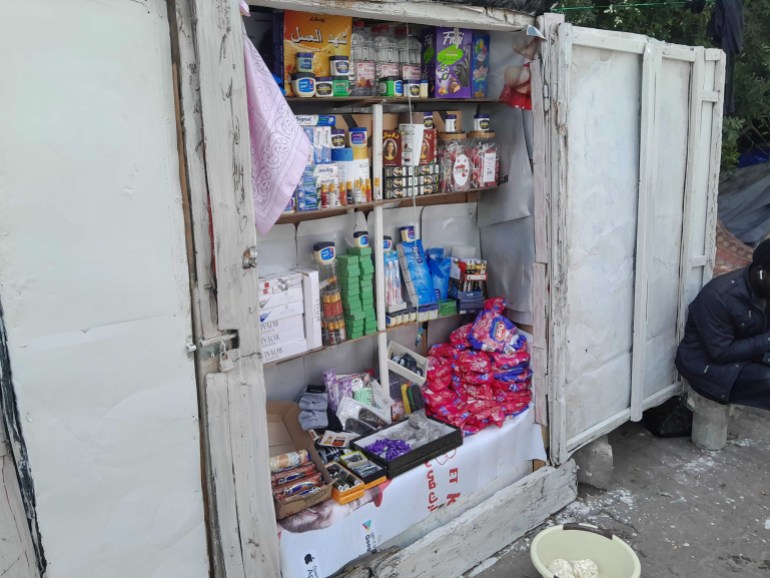Many of those outside the IOM that day had escaped from Libya and had first-hand knowledge of the abuse that people face there.
Armed gangs and militias have governed much of Libya since it emerged from the 2011 revolution that overthrew long-term dictator Muammar Gaddafi.
As the militias’ influence has grown, so too has their control over lucrative human trafficking networks, which have soared in volume since the days when Gaddafi could worry Europe by threatening to ease his foot off Libya’s human pipeline to its coast.
Those militias, reportedly along with Libya’s Europe-backed coastguard, now exert ruthless control over the trade, with unprotected refugees and migrants crossing the country from sub-Saharan Africa routinely intercepted and held hostage in a network of coastal prisons.
Once inside, many are tortured, with video of their savage ill-treatment sent to distant families with demands for ransom transmitted by smartphone.
The price of securing Europe’s borders
“They torture me so much,” 19-year-old Mohammed Lamin Kamara from Sierra Leone recalled, showing the scars that ran across his hands and the branding mark that sat upon his arm.
“I remember they flog us. They would hit me on my hands, my back,” he said, describing how everyone in the 10 or so rooms at Warshefana, near Tripoli, where he was held would be subjected to daily abuse by the guards.

“When they are flogging you and the blood starts to come out, the pain you are going to feel is extremely hard,” he said.
“They use cables, irons, just to torture you,” he said, going on to describe how they would press burning metal or plastic against skin to elicit the most extreme reaction for their families at home.
“Some people go into a coma, some people pass away. They take those bodies and take them into the desert, just to get money.”
As Mohammed talked, a small crowd of similarly aged men gathered around him. All knew of someone else, of either gender, who had been raped at gunpoint.
Italy’s ruling
Earlier this month, Italy’s highest court upheld a ruling that Italian vessels could no longer return refugees rescued at sea to Libya, widening the gulf between the country’s legal system and political establishment which, along with its European allies, seems intent on maintaining the Libyan militias’ funding in a bid to force irregular arrivals away from their shores.

In 2017, Italy and Libya signed a memorandum of understanding that was renewed automatically for the second time in February 2023.
Under the terms of that agreement, Italy planned to pay some 10 million euros ($10.8m) last year towards bolstering Libya’s maritime authorities.
In addition, the Italian government has gifted several search-and-rescue vessels to Libya, as well as having trained the crews now routinely accused of abusing those they claim to be rescuing.
“The [court’s] judgement is important in that it officially reiterates what many have been saying for years: that Libya is not a place of safety, and refugees and migrants rescued in the central Mediterranean should never be disembarked there,” said Matteo de Bellis, a researcher at Amnesty International’s Brussels office.

He explained that charities and rights groups had been aware of the case as it made its way through Italy’s courts for the last few years.
“The Italian coastguard and government have long known that returning migrants to Libya would be unlawful, because of the conditions there. Instead, they looked for ways around those restrictions, such as helping fund, equip and train the Libyan coastguard.”
Both the European Union and Libya have also been charged by rights groups with assisting the Libyan Coast Guard in declaring an expanded search-and-rescue zone, over which it exerts unchallenged control, limiting the need for European countries to deal directly with the group.
Rule by militia
According to a spokesperson for the IOM, there are 3,500 refugees being held in the official detention centres across western and eastern Libya.

More are held in the unofficial centres, the bulk of which are thought to be clustered around the capital in northwest Libya. However, ascribing any kind of number to those detained is, by its nature, impossible.
After an extensive study on the treatment of irregular migrants in Libya last year, the United Nations cited multiple cases of torture and sexual slavery – a crime against humanity – as being relatively commonplace in the network of detention centres.
Nearly all the survivors interviewed by the international body confirmed that they had refrained from lodging complaints out of fear of reprisals.
“We were about eight hours from Zawiya when they caught us,” 24-year-old Ismael Fafanah from Sierra Leone said of his attempt to reach Europe from northwest Libya last year.
“The coastguard took us to the prison and said I should call my mum and have her send me money, ” he said, echoing Mohammed’s account of being tortured on film in an attempt to force his family in Sierra Leone to pay his ransom.
In Ismael’s case, it was his brother who came through, selling his land for the $1,000 needed for Ismael to gain his freedom and continue to Tunisia.

“It’s my fault,” Ismael continues, stressing his determination to repay his brother. “No one sent me [to Libya]. I did it on my own. I thought I could escape my country and find a better life in Europe. I had always wanted to send money back to my family and the people at home.”
For now, the refugees and migrants wait for spring to come and the seas to calm. None of those camped outside the IOM ever intended to become stranded in North Africa.
In addition to the torture they endured in Libya, many have already endured war zones, days on the road, and prolonged hunger.
Nearly all have dreamed of their new lives in Europe, of the money they will earn and transfer to the families they left behind.
Neither the dangers of the sea crossing, European coastguards, nor the distant threat of eventual deportation is likely to deter them.